-
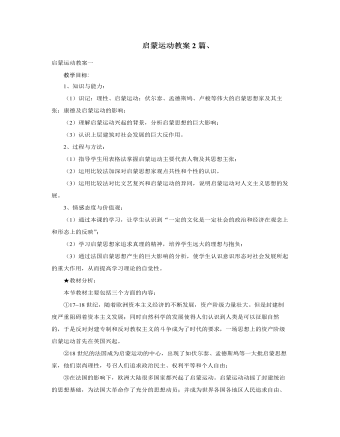
人教版高中历史必修3启蒙运动教案2篇
教学目标:1、知识与能力:(1)识记:理性、启蒙运动;伏尔泰、孟德斯鸠、卢梭等伟大的启蒙思想家及其主张;康德及启蒙运动的影响;(2)理解启蒙运动兴起的背景,分析启蒙思想的巨大影响;(3)认识上层建筑对社会发展的巨大反作用。2、过程与方法:(1)指导学生用表格法掌握启蒙运动主要代表人物及其思想主张;(2)运用比较法加深对启蒙思想家观点共性和个性的认识。(3)运用比较法对比文艺复兴和启蒙运动的异同,说明启蒙运动对人文主义思想的发展。3、情感态度与价值观:(1)通过本课的学习,让学生认识到“一定的文化是一定社会的政治和经济在观念上和形态上的反映”;(2)学习启蒙思想家追求真理的精神,培养学生远大的理想与抱负;(3)通过法国启蒙思想产生的巨大影响的分析,使学生认识意识形态对社会发展所起的重大作用,从而提高学习理论的自觉性。

新人教版高中英语必修2Unit 2 Wildlife Protection-Reading for Writing教案二
This lesson aims at making a poster about protecting wildlife after reading some posters. During reading students are guided to understand the content and try to summarize the posters with one sentence. Then students are guided to try to make a poster about protecting wildlife.1. Read the two posters and try to understand the summary sentences.2. Look at the two posters and try to understand what emotions they express.3. Try to summarize the features of posters4. Try to make a poster about wildlife.1. Look at the two posters and try to understand what emotions they express.2. Try to summarize the features of posters3. Try to make a poster about wildlife.Step 1 Lead inLook at the the posters on the textbook and ask:Which emotions do the posters communicate ?Step 2 Read the poster and answer the questions.1. What do you think of the animals in the poster on the left ?I think it is frightening and ugly.2. Why do we should protect the ugly animals ?All species--the good, the bad, and the ugly-- should be treated equally.The world needs all kinds--without variety, our planet cannot survive.3. Why are billions of trees being cut down every year ?To make paper for humans.4. What result will be lead to after the trees are cut down ?A lost of animal homes are being destroyed./The habitat of wildlife is being destroyed.Step 3 Find the feature of posters1. What does each poster use to stir up emotions ?On the left, it makes us a little frightened and it looks a little ugly, but it can activate our curiosity--What is it? And What is wrong with it?On the right, it makes us feel a little sad and want to protect them.

新人教版高中英语必修2Unit 3 The Internet-Discovering Useful Structure教案二
This teaching period mainly deals with grammar “The Present Perfect Passive Voice.” To begin with, teachers should lead students to revise what they have learned about the Present Perfect Passive Voice. And then, teachers move on to stress more special cases concerning this grammar。This period carries considerable significance to the cultivation of students’ writing competence and lays a solid foundation for the basic appreciation of language beauty. The teacher is expected to enable students to master this period thoroughly and consolidate the knowledge by doing some exercises. 1. Guide students to review the basic usages of the Present Perfect Passive Voice2. Lead students to learn to use some special cases concerning the Present Perfect Passive Voice flexibly.2. Enable students to use the basic phrases structures flexibly.3. Strengthen students’ great interest in grammar learning.1. Help students to appreciate the function of the Present Perfect Passive Voice in a sentence2. Instruct students to write essays using the proper the Present Perfect Passive Voice.观察下列句子特点,总结共同点。1.(教材P28)Much has been written about the wonders of the World Wide Web.2.(教材P28)But the Internet has done much more for people than simply make life more convenient.3.(教材P28)Many people have been helped by the club.4.(教材P28)She no longer feels lonely, and her company has become quite successful.5.(教材P32)Today I thought I’d blog about a question that has been asked many times—how do you stay safe online and avoid bad experiences on the Internet?

新人教版高中英语必修2Unit 3 The Internet-Reading and Thinking教案二
Q5:What's Jan's next goal?Her next goal is to start a charity website to raise money for children in poor countries.Q6:What can we learn from her experiences?We learn that when we go through tough times, we can find help and support from other people online. We learn that we can feel less lonelyStep 5: While reading---rethinkingQ1: What is Jan’s attitude to the Internet ?Thankful/Grateful, because it has changed her and her life.Q2: What writing skills is used in the article ?Examples(Jan’s example, the 59-year-old man’s and the 61-year-old woman’s example)Q3: Can you get the main idea of the article ?The Internet has changed Jan’s life/Jan’s life has been changed by the Internet.Step 6 Post reading---Retell the storyMuch has been written about the wonders of the World Wide Web. There are countless articles (1)telling(tell) us how the Internet has made our lives more convenient. But the Internet has done a lot (2)more(much) for people than simply make life more convenient. People’s lives (3) have been changed(change) by online communities and social networks so far. Take Jan for example, who developed a serious illness that made her (4)stuck(stick) at home with only her computer to keep (5)her(she) company. She joined an online group (6)where she could share problems, support and advice with others. She considered the ability to remove the distance between people as one of the greatest (7)benefits(benefit). She was so inspired (8)that she started an IT club in which many people have been helped. She has started to learn more about how to use the Internet to make society better. Her next goal is to start a charity website to raise money (9)for children in poor countries. Jan’s life has been (10)greatly(great) improved by the Internet.

新人教版高中英语必修2Unit 4 History and Traditions-Discovering Useful Structure教案二
This teaching period mainly deals with grammar: The past participle is used as attributive and objective complement.1. Guide students to review the basic usages of the past participle used as attributive and objective complement.2. Lead students to learn to use some special cases concerning the past participle used as attributive and objective complement flexibly.3. Strengthen students’ great interest in grammar learning.1. Help students to appreciate the function of the past participle used as attributive and objective complement.2. Instruct students to write essays using the past participle used as attributive and objective complement.Step1:温故而知新。Analyze the underlined phrases and then sum up the common usages of the past participles.1.(教材P41)They had castles built(build) all around England, and made changes to the legal system.2.(教材P42)They use the same flag, known(know) as the Union Jack,...3.(教材P42)Judy and I had our car parked(park) in an underground car park near Trafalgar Square, where we could get our car battery charged(charge).Common points: f the past participle used as attributive and objective complement.Step 2:过去分词作定语时的意义1.及物动词的过去分词作定语,在语态上表示被动;在时间上,常表示动作已经发生或完成,有时也不表示时间性。Our teacher watched us doing the experiment and gave us a satisfied smile at last.我们的老师看着我们做实验,最后给了我们一个满意的微笑。The plan put forward at the meeting will be carried out soon.会上提出的计划将很快被执行。2.不及物动词的过去分词作定语,它不表示被动意义,只强调动作完成。Many little kids like gathering fallen leaves in the yard.

新人教版高中英语必修2Unit 5 Music-Discovering Useful Structures教案二
4. When he got absorbed in his world of music, he felt as if he could “see” the beauty of the world around him, like he had in his previous life.P·P as adverbial: _________________________________________________________________.Function: _______________________________________________________________________.Step 5 Solid Complete the passage with the words in brackets in their correct forms.Well known as a successful band, the Impact members show quite a few striking qualities. They never ever give up. When _____________(question) by the media, they are not _____________(discourage) and practise even harder. They are improving themselves by attending several master training class. They are united. _____________(fill with) team spirit, they act as a whole, always aiming for glory. Step 6 Difference and similarity from -ingObserve the following examples.1. He went out, shutting the door behind him.=He went out, ________________________________________________________.2. Not knowing what to do, he went to his parents for help.=__________________________________________, he went to his parents for help.Similarity: _______________________________________________________________________________________________________________________________________________________.Difference : _______________________________________________________________________________________________________________________________________________________.Step Practice1. ________ in a hurry, this article was not so good. 因为写得匆忙, 这篇文章不是很好。2. ________ carefully, he found something he hadn’t known before. 他仔细读书时, 发现了一些从前不知道的东西。3. ________ why he did it, the monitor said it was his duty. 当被问及他为什么要这么做时, 班长说这是他的职责

新人教版高中英语必修2Unit 5 Music-Listening&Speaking&Talking教案
choir memberspeople to run food stands people to sell festival ticketspeople to sell music CDspeople to set up equipmentmusical performersStep 2: Listen to the announcement again and answer the questions. ? 1. What kind of songs will Grace Davis sing at the festival?? 2. Who can try out as a performer?? 3. What can those who think they do not have musical talent do?? 4. How can students volunteer to take part?? Talking about preferences:? Would you prefer doing ..?? What would you prefer to do?? Would you rather do .... or ….?? What would you rather do?? I'd prefer .... to ..? I'd rather have ... than .. Step 3: Speaking ProjectWork in groups. Role-play the conversation or make a new one.? Debbie: Where have you been? You missed the announcement about the music festival.? John: I was at the doctor's office. Music festival?? Frank: Yes, it's going to be next month on the school sports field. John, you can play the piano. How about playing it at the festival?? John: Well, I'd rather play the violin. I can play Liang Zhu.? Frank: Wow! Sounds good. What about you, Debbie? ? Debbie: Actually, I don't have much musical ability. I'd prefer just to help out with the crowds.? Frank: You can sell tickets or work at a food stand.? John: So can I assume that the aim of the festival is to raise money?? Debbie: Yes. All of the money will go to charity.

新人教版高中英语必修2Unit 5 Music-Reading and Thinking教案二
1. Get basic information about Eric; read deeply to understand the history and development of the virtual choir.2. Understand what the function of the virtual choir is and how to make a virtual choir.3. Understand the meaning of some languages in the context of the text through question guidance, such as “Many people do not have close friends or contacts who have the same interest in music.” and so on.Step 1 Leading-in1. Answer the following questions.Q1:Do you know the Apps like Tik Tok and Quick Hand?Q2: Do you want to make a Tik Tok video or a Quick Hand video?2. Play a Tik Tok video Step 2: Understanding the title Q1:What does the title mean ?Q2: Is the article a narration or exposition? Why? Q3: Can you change the title ? If you can, what is the title?Step 3: Scanning the whole text and getting the basic information1. Answer the following questions.Q1:Who came up with the idea for a virtual choir?Q2: Where did Eric studied the musical composition?Q3: What is his song?2. Find the main idea of each paragraph3. Deal with some new words.Step 4: Reading carefully to get detailed informationPara 1 How to make a virtual choir1. PreparationA. tools: a virtual camera; an Internet connectionB. hero/heroin: friends or some individuals who have the same interests2. Process

新人教版高中英语必修2Unit 5 Music-Reading for Writing教案二
The Internet celebrity Gao Yifeng. Years ago, he owned 5 companies and the staffs over 1,000, but during the economy crisis, he became nothing but debt. He was so worried that his hair became white overnight. There was a time when he wanted to killed himself. But after listening to the song Start Over by Liu Huan, he decided to cheer himself up. He started a steamed bun shop and gradually became a national chain shops. Now he became successful again.Walter Haddon said, “Music is the medicine of a troubled mind.” Music contains such a pleasant and inspiring force. Music gave him courage and bravery. When he listened to the song, it made his spirit fly like a kite in the wind. Music gave him strength and brought him relief. It was the rock I leant on to become strong and to get through those hard times. I hope none of us have to go through the same kind of suffering that he did. At the same time, we all go through various periods when we feel sad or alone. During those times, music can help us in the same way that it helped him. I hope we all will somehow begin to treasure music and make it a part of our life. Thank you for your listening !5.Revise your writing each other.Does he/she explain how music has changed his/her/someone else’s life?Are some of the rhetorical devices included and used properly ?Does he/she talk about how music makes him/her/someone feel?Is the first word in each sentences capitalised?Does he/she use correct punctuation ?
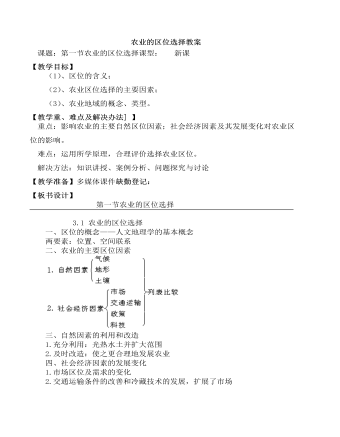
人教版高中地理必修2农业的区位选择教案
【教学目标】 (1)、区位的含义;(2)、农业区位选择的主要因素;(3)、农业地域的概念、类型。【教学重、难点及解决办法] 】重点:影响农业的主要自然区位因素;社会经济因素及其发展变化对农业区位的影响。难点:运用所学原理,合理评价选择农业区位。解决方法:知识讲授、案例分析、问题探究与讨论【教学准备】多媒体课件缺勤登记:三、自然因素的利用和改造1.充分利用:光热水土并扩大范围2.及时改造:使之更合理地发展农业四、社会经济因素的发展变化1.市场区位及需求的变化2.交通运输条件的改善和冷藏技术的发展,扩展了市场

人教版高中地理必修3资源的跨区域调配教案
使学生了解天然其资源的特点, 我国天然气资源分布 和 利用开发现状,理解西 气东输工程的意义,学会分析跨区域资源调配与区域经济发展之间的关系。过程与方法 1、通过对我国天然气资源利用开发现状的分析,培养学生地理逻辑思维能力。2、通过学生阅读分析图表文字信息,提高学生归纳 和把握事物重点的能力。3、通过活动设计,培养学生自主学习能力和探究能力。情感、态度与价值 观1、通过我国资源开发利用与经济发展之间的矛盾分析,培养学生全面、辩证看待问题的能力。2、通过对天 然气跨区与调配工程和西电东 送工程 的了解,帮助学生树立正确的资源观和环境观。教学重点1、我国能源生产和消费地区差异、油气资源 分布和开发现状。2、提高资源利用效率,促进东、西部之间协调发展。3、理解西电动送工程的原因及意义。

人教版高中语文必修2《采薇》教案2篇
这两章是对战争场面的描写。写的是战车、战马、象弭、鱼服以及士兵的劳累奔波、饥渴难当,通过这些具体生动的细节描写来展现战争生活的图景。而没有写战场上的刀光剑影、厮打拼杀,但战争的残酷已可想见。4“昔我往矣,杨柳依依。今我来思,雨雪霏霏”被视为情景交融的佳句。清人王夫之在论《诗经·小雅·采薇》这两句时说:“以乐景写哀,以哀景写乐,一倍增其哀乐。”谈谈你的看法。一以往昔之虚衬眼前之实,以出征之乐衬内心之思亲之悲痛;二“杨柳依依”与“雨雪霏霏”对比,突出不胜今昔之感;三大雪交加,饥渴难当,情境实悲,以哀景写哀情。四、交流延伸1写一首诗或一段文字表达你对“乡愁”的新的体验。在全班交流。2课后搜集更多的表现乡情的诗歌散文作品,将你最感动的一篇拿到班上与同学分享感受。
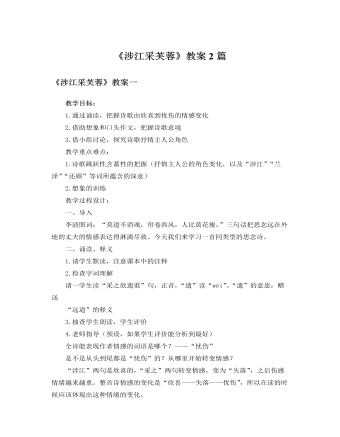
人教版高中语文必修2《涉江采芙蓉》教案2篇
三、想象画面,把握意境1.指导想象学习陶渊明的《归园田居》我们脑海中自然会出现一幅幅的画面,比如他归家后的生活场景,我们会想象“榆柳”是如何遮蔽房屋的,而“桃李”又是如何摘种在房前的。我们会想象村落是如何在薄雾中若隐若现的,想象炊烟是如何袅袅升起的。《涉江采芙蓉》一诗只有8句话,更需要我们展开想象,去构画场景,这样才能深入诗歌,体会到诗歌的味道。2.学生想象要求学生闭目想象1分钟。3.学生展示想象结果(抽三四个学生回答即可)4.老师指导纠正学生想象不合理之处。要注意的地方:“江”可能学生会想象成小溪流、小池塘。“兰泽”可能学生理解成“湖泊”。注意字词“还顾”“漫浩浩”中隐含的情感,注意“离居”中流露的愁怨。5.时间允许的话,老师读自己的下水作文。
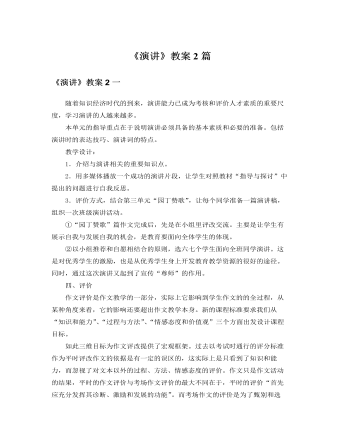
人教版高中语文必修2《演讲》教案2篇
一个世纪前,一位了不起的美国人签署了奴隶解放宣言,而我们今天就站在他的塑像下面。对于千千万万身受不公正待遇之苦的黑奴来说,这份划时代的文件,是一座光芒万丈的希望灯塔,是结束他们被束缚之漫漫长夜的快乐黎明。我有一个梦,有朝一日在乔治亚州的丘陵地带,奴隶的后代与奴隶主的后代,将能够兄弟般地相处。我有一个梦,有朝一日甚至密西西比州,这个充满不平与压迫的州,将转化成一片自由与公正的绿洲。我有一个梦,我的四个孩子,有朝一日将可以生活在这样一个国度里:在此人们不是根据他们的肤色,而是根据他们的品行来衡量他们。我今天有一个梦!我有一个梦,有朝一日在阿拉巴马州,尽管目前有许多恶毒的种族主义者,尽管州长叫嚷着要与联邦政府对抗,有朝一日在阿拉巴马州,黑人孩子与白人孩子将会像兄弟姊妹那样亲密无间。
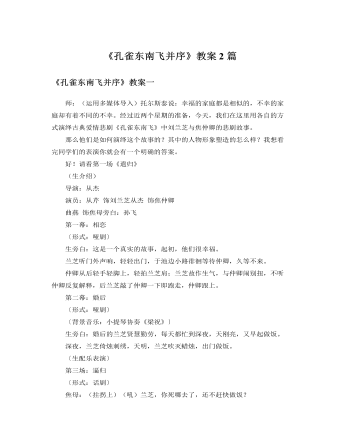
人教版高中语文必修2《孔雀东南飞并序》教案2篇
让学生仔细聆听美妙的音乐,合作讨论,加深理解。(1)本诗文中的“兰芝被遣”和“兰芝抗婚”的情节,可与乐曲展开部第一阶段“逼嫁抗婚”对比阅读。文中的刘兰芝是在封建礼教的压迫下被遣归及被迫“改嫁”,刘兰芝与祝英台一样都进行了抗争。乐曲中的乐器奏出了具有威胁力的封建势力的主题,代表着封建势力的凶暴残酷,同时叙述了祝英台的悲痛和不安心情,表现了控诉、抗争的感情。(2)本诗文中的“夫妻誓别”的情节,可与乐曲呈示部中的结束部“长亭惜别”对比阅读。文中刘兰芝与焦仲卿的誓别。二人分手之际,依依不舍,“举手长劳劳,二情同依依”。乐曲中梁祝分别时依依不舍又充满悲伤,音调抒情徐缓。让学生在徐缓的音乐中去感受刘兰芝与焦仲卿生离死别的痛苦。
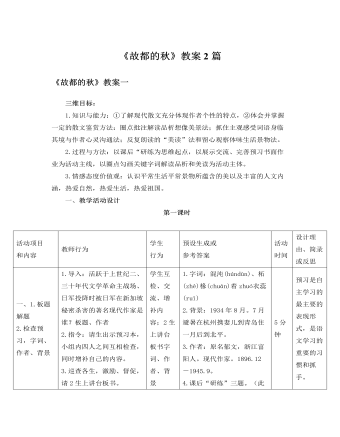
人教版高中语文必修2《故都的秋》教案2篇
三、具体研习1、文章的哪些段落描写了故都的秋?郁达夫先生既然这么喜欢故都的秋,那么他选取了哪些画面来写故都的秋?(学生阅读圈点,教师引导学生找关键词、关键句。)明确:从3--11自然段。主要是5幅画面,第3段庭院静观(破屋秋色),第4段槐树落蕊(街头落蕊),第5段秋蝉残鸣,第6—10段闲话秋凉,第11段清秋佳果。2、故都的秋有什么特点?明确:清、静、悲凉。2、作者在对这些景具体的描绘中,是如何体现故都秋“清、静、悲凉”的特点的呢?(下面先请同学来诵读课文3——11段落,其他同学要眼耳手脑并用,一是圈出文中体现秋天色彩的词语,二是标出传递声响的物名。我们将从“秋色”和“秋声”两个角度来品味一下故都的“秋味”。)
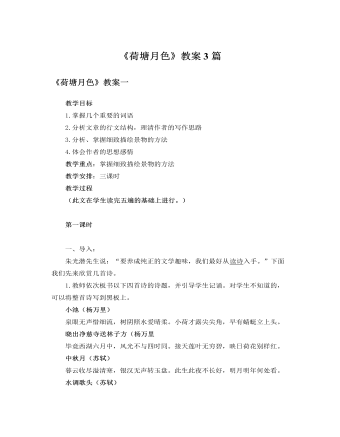
人教版高中语文必修2《荷塘月色》教案3篇
请问,作者究竟听到歌声没有?”学生回答:“没有。”“这里是比喻,因为这里用得是‘仿佛’一词……”对,是比喻。也就是说,作者是用歌声来比喻荷香,是吧?“但是,“荷香与歌声有什么可比的共同点吗?”“荷香与歌声都是断断续续、若有若无的。”“而且朦朦胧胧的。”“对。“荷香和歌声都是‘缕缕’的、‘渺茫’的。这是比喻。这是一种特殊的比喻,钱钟书先生把它叫做‘通感’。人们通过视觉、听觉、触觉、味觉、嗅觉等五官感知外界事物时,在一般情况下,彼此不能交错;但在特殊情况下,五官功能却能出现互相转化、彼此沟通的现象叫“通感”,也叫“移觉”。举几个例子来说明:诗人艾青曾写诗这样描绘日本著名指挥家小泽征尔:‘你的耳朵在侦察,你的眼睛在倾听……’这也是通感。又如:“那笛声里有故乡绿色平原上青草的香味,有四月的龙眼花的香味,有太阳的光明。”(郭风《叶笛》)

人教版高中语文必修2《兰亭集序》教案3篇
三、指导第一段的背诵,点拨理解句意,强调关键词语,注重文言基础知识教学。过程中要让学生反复读背。背诵线索:时间——地点——事件——人物——环境——活动——天气——感觉。时间:永和九年,岁在癸丑,暮春之初。地点:会于会稽山阴之兰亭。事件:修稧事也。人物:群贤毕至,少长咸集。环境:此地有崇山峻岭,茂林修竹;又有清流激湍,映带左右。活动:引以为流觞曲水,列坐其次。虽无丝竹管弦之盛,一觞一咏,亦足以畅叙幽情。天气:是日也,天朗气清,惠风和畅。感觉:仰观宇宙之大,俯察品类之盛,所以极视听之娱,信可乐也。四、学生自读背诵5分钟。五、抽一至二名学生试背课文,教师可作必要的线索提示。第二课时一、听名家示范朗诵,学生小声跟读。二、复习巩固第一自然段的阅读背诵。三、朗读、解析第二自然段,理解文章“由叙入感”的写作结构。

人教版高中语文必修2《离骚》教案2篇
四、品味诗歌艺术1、诗人是如何表现其品质的?运用了什么修辞手法?产生了怎样的表达效果?明确:诗句“扈江离与辟芷兮,纫秋兰以为佩”很好地体现了诗人光辉俊洁的人格。用“江离”“辟芷”“秋兰”三种香草来装饰自己,比喻自己,极其生动形象地表现了诗人自己美好的精神世界,使诗歌充满了浪漫主义气息。2、《离骚》中作者常以“香草”、“美物”来比喻自己、贤士和君王,并表达政治理想,这是《离骚》的一大艺术特色,这种方法叫做“移情法”,即不直接说出自己想说的话,而是把它寄寓于某一物上,也就是“移情于物”,这种方法在古典诗词中广泛运用,在政治不清明的时代,借用“移情”,可言难言之语,抒难抒之情。请找出相关的诗句,说说诗人是怎样运用这些比喻来表达政治理想的。

人教版高中语文必修2《囚绿记》教案2篇
教学设想:本节课的主题是“生命之绿,璞玉心灵”,用圈点批注法解读爱绿的感情,让学生在批注中明确“绿”的象征意义,而不只是结论的传递。同时借助于阅读、感受和理解把握作者对绿的认识是不断升华的,由一般对生命希望之绿的喜爱,到与绿交往后被它的不畏强暴,永远向阳的精神所折服,最后在特定的时代背景下绿在作者的心目中已经成了我们民族不屈精神的象征。让学生评中求解,评中悟情,评中明理,评中品味。教学进程:一、导语上节课我们学习了朱自清的《绿》,初步了解了读书动笔的基本方法,这节课我们继续用圈点批注的方法来学习陆蠡的散文《囚绿记》。二、释题师:看标题,囚绿之“绿”在文中具体指什么?(一株常春藤)“囚”就是囚禁的意思,那题目就是记述囚禁绿色常春藤的经过。三、圈点、把握情节作者为什么要囚绿呢?文中除了写“囚绿”之外,还写了哪些有关绿的意念和行动?带着这样的质疑用自己喜欢的方式朗读课文,请同学们圈点出疑难字词,或结合书下注释,或同学合作解决,解决不了的,可提出来我们共同解决。标注段落节次。勾画出表现作者对绿意念和行动的句子。